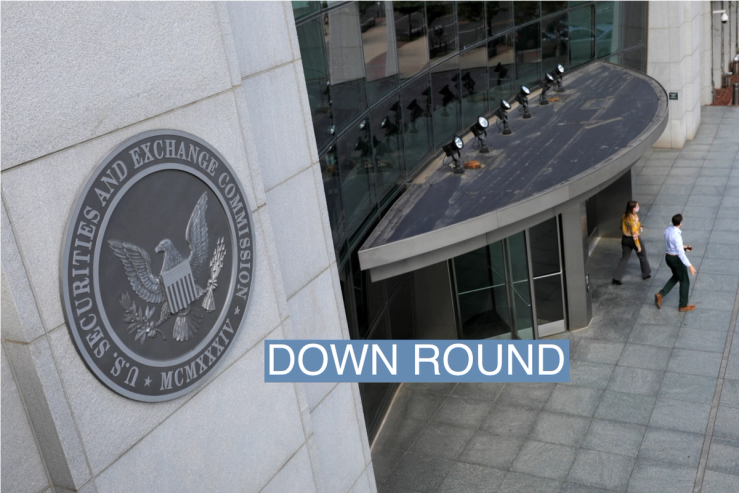The Writer
Holli Heiles Pandol is policy counsel for Carta, which offers equity management software to startup founders, employees, and venture capital. Previously, she worked as senior counsel and director of legislative and intergovernmental affairs at the Securities and Exchange Commission.
Guest Column
The U.S. Securities and Exchange Commission’s widespread crypto crackdown has been in the media spotlight, but the agency is also set to deal a major blow to America’s engine of innovation and job creation.
The SEC has proposed rules that would radically alter how the private fund industry — including venture capital — operates and is regulated, even as the ecosystem wobbles under the pressure of macroeconomic strains and the loss of critical banking partners. If implemented as proposed, these new rules will constrain the activities of private fund advisers — that is, the managers of the funds.
They aren’t the only ones who should be concerned: The proposed rules would also hurt startup founders. And because the measures would have a bigger impact on the managers of small and emerging funds, the SEC may also be jeopardizing efforts to close funding gaps for women and minority founders.
Worst of all, the proposed rules could throw a wrench into one of the greatest machines for economic growth that this country has ever devised by worsening the financial pain afflicting the private markets, accelerating layoffs, and stifling innovation and job creation.
Here’s how:
First, the rules would impose new obligations for SEC-registered private fund advisers. These new mandates would include standardized disclosures to investors on fund fees, expenses, and performance. These changes, along with new accounting requirements, would increase costs and lower return margins, ultimately reducing the money invested in private markets.
The measures would also have major implications for venture capital through new prohibitions, even though Congress specifically exempted these advisers from enhanced SEC oversight. Two, in particular, represent drastic deviations from common industry practice and would significantly impact the way venture capital funds do business.
Side letters: Perhaps most significant is the prohibition of preferential treatment, which is meant to eliminate the use of side letters — agreements that fund advisers have with investors on an individual basis. While they indeed provide preferential treatment to certain backers, side letters are a critical tool that fund advisers use to attract anchor investors.
New and emerging funds, which may not have a track record or access to an investor network, often struggle to attract capital. Bringing on an anchor investor can help signal a fund’s credibility and raise more money. But to land that kind of backer, the fund may need to establish a bespoke relationship agreement. By banning certain preferential side letter terms, the proposed rule would make it harder for emerging funds to attract that critical anchor investor.
Liability exposure: Generally, agreements between fund general partners and limited partners indemnify the fund and fund manager, except in the cases of gross negligence, fraud, or other malfeasance. The SEC’s proposed rule drastically shifts this standard and prohibits indemnification for simple negligence — a low bar for legal challenge.
Risk is inherent in the venture model: fund managers invest in and help guide innovative and transformative ideas at the earliest stages. Not all these ideas work out. Heightened liability would negatively impact investment and the business decisions an adviser makes. There may be some more second-guessing if bets go south — an outcome more likely to happen in a shrinking economy. With higher liability exposure, managers will be more cautious, and innovation will suffer.
Prohibiting the use of side letters and conventional indemnification clauses would overturn standard practice in the industry. These changes would not only apply on a prospective basis, but retroactively as well, as there is no grandfathering provision to recognize existing contractual relationships. This means investor agreements may need to be renegotiated for funds to come into compliance — a costly endeavor. And because of another prohibition in the rule, funds won’t be able to write off the costs.
Impact of the new rules
On its face, the SEC’s proposed rules might just sound like they’ll only affect venture funds and their investors. After all, and with few exceptions, only wealthy individuals and institutions are able to invest in private funds in the first place. But the consequences of sweeping new rules could be far more wide-reaching — and far more dire: They run the risk of rolling back gains in diversifying the venture sector and could contribute to a capital crunch in the innovation economy.
More industry concentration and less diversity
By driving smaller players out of the market with compliance obligations that they can’t afford, the SEC’s rules could reduce competition and entrench established incumbents. It will also be more expensive and harder for these funds to raise and deploy capital, particularly outside of established financing networks.
The industry has made great strides in becoming more inclusive, and much of this work is through emerging managers investing in traditionally underrepresented communities and geographies. By raising barriers to entry, the proposed rules could eliminate much of this progress by making smaller funds far less attractive to institutional capital.
Lopsided funding for innovation
A less diverse and more highly concentrated private fund industry is not good for innovation. Larger funds typically write large checks to support private businesses at the later stages of development. The reverse is also true: Funding for new startups most often comes from managers of smaller funds.
Founders of successful startups and members of their founding teams often go on to become emerging venture capital managers. Their networks are dense with entrepreneurs who aim to start their own innovative companies. By disproportionately impacting this type of smaller fund, the SEC could hobble the pace of transformative innovation that has helped America retain a competitive edge in an increasingly competitive global landscape.


